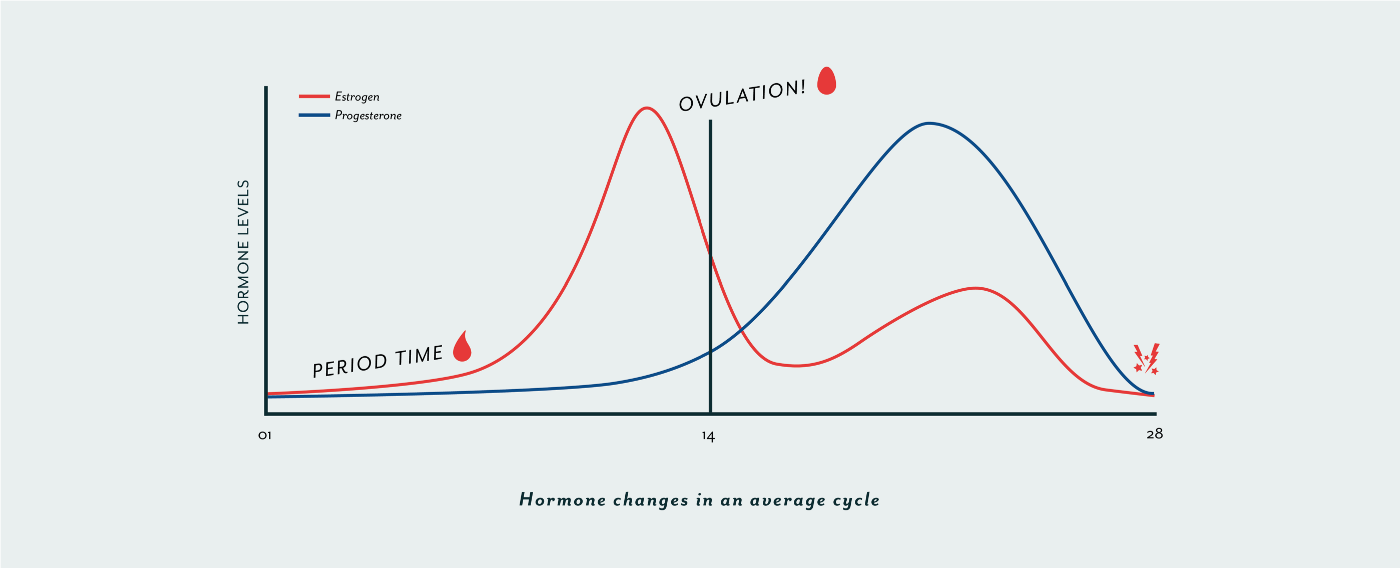Why is my period lighter than usual?
Jun 09, 2022
Have you noticed that your periods are shifting? They used to last a whole week, and now they're only 5 days, or maybe even 3?
It can be normal for your period to start off heavy when you first start menstruating, and then slowly get lighter over time until it evens out after a few years.
But if you've noticed a steady decrease in your bleeding that hasn't evened out, this could indicate some hormonal imbalances.
How little is too little?
On average, you want to be losing about 30-40 mL of blood. Anything more than 80 mL is considered a heavy period (menorrhagia), and anything under 25 mL is considered a light period.
Did you know you can actually measure how much blood you're losing? It's easiest if you use a menstrual cup, but you can still do it with pads and tampons. If you use a cup, check with your manufacturer and see how many mL's it holds.
-
A fully saturated super tampon can hold up to 12 mL of fluid.
-
A fully saturated light tampon can hold up to 3 mL of fluid.
-
An overnight pad holds about 10-15 mL of fluid.
So, if you're finding that your period went from 40 mL of bleeding to 20 mL of bleeding over time, then we can assume you might have something going on hormonally.
What is the cause of my lighter periods?
This could be due to a number of factors. Anything from low estrogen, to stress, to anemia, to thyroid issues! This is why it's important to work with a professional to figure out the root cause before self treating!
Stress:
This is one of the biggest factors for changes in your period. Stress can affect everything in your body, from your thyroid to your gut microbiome to your periods. It's all connected.
There's a few simple things you can do to manage stress and keep things at bay:
-
Consistent routines. Your body loves routine and requires this to feel grounded and safe. Keep a routine you follow for 30 minutes every night and every morning. This can be anything from stretching, to journaling, to reading, to taking a bath, sipping tea with your roomates or partner. Do something you enjoy doing, and preferably, no screens within 30 minutes of going to sleep, or 30 minutes of waking.
-
Adaptogens. Herbs can be a powerful way of helping to regulate your cortisol rhythm and manage your stress. Here are a few that I use regularly: - Ashwagandha - Tulsi (Holy Basil). Bonus: it's safe for pregnant women! - Maca
-
Fill your cup. And do so everyday. Find something you enjoy doing on a daily basis and make it a point to do that. If it's taking a walk, make time for that. If it's reading your favorite book or magazine, do that. If it's sipping a cup of tea while it's still hot, then ask the people in your life to allow you 5-10 minutes to do this. No one else can fill your cup! Make sure you're taking time to do it.
Low Estrogen
Estrogen is responsible for building up your uterine lining, that you will eventually shed at the end of your cycle. If your estrogen levels are low, then the lining you build won't be thick, and your shedding (aka your period) will be lighter.

It's always a good idea to get tested. You will need to test in your follicular phase and your luteal phase to get a good representation of what's going on with your estrogen levels.
Note: stress can cause estrogen levels to dip! So again, back to that stress management.
Anemia
Usually due to iron deficiencies. Make sure you're getting tested with a full iron panel, checking your ferritin (iron storage), and checking your red blood cells to make sure you're getting a thorough workup to check for anemia.
Anemia can happen for a couple different reasons. Either you're not absorbing enough iron or you're not getting enough. If your body is lacking iron, it can slow down the menstruation process.
Iron rich foods include:
- Meats
- Seafood
- Legumes (beans, lentils, etc)
- Dark leafy greens (make sure you combine this with some vitamin C to help absorb the iron better)
Thyroid Disorders
Studies find that women with thyroid issues experience more menstrual irregularities than women who do not have thyroid disease.
The menstrual cycle is controlled by the HPG axis (hypothalamic-pituitary-gonadal axis). This is the communication between your brain and your ovaries, in females.
This HPG axis is closely related to the HPT axis (hypothalamic-pituitary-thyroid axis). While the relationship between your thyroid and female sex hormones is complicated, there is plenty of research and evidence to show that women are more likely than men to develop thyroid disorders.
And these disorders most commonly occur during windows of hormonal shift (puberty, pregnancy, and menopause), indicating a connection between estrogen and your thyroid!
If you're concerned about a thyroid disorder, make sure you're getting worked up! A basic thyroid panel should include:
- TSH
- Free T4
- Free T3
- Total T4
- Thyroid antibodies (make sure these are included! this piece is important)
Adequate Nutrition
Hormone metabolism (the making of your hormones) requires a lot of nutrients, and in particular, healthy fats and carbohydrates.
Healthy fat servings per meal include about 1/4 cup of nuts and seeds, or 1 tablespoon of oil (coconut, olive oil, etc), OR 1/4 of an avocado (not whole avocado).
Healthy carbs don't mean fortified pastas and breads. Healthy carbs are whole grains and vegetables. Include 1 cup with every meal of either a whole cooked grain or veggies!
If you're wondering what happened with your period, make sure you chat with a provider and get the correct testing. Remember, it's always best to test, don't guess!
If you want to check in on your hormones and get a better understanding of what may be causing your period irregularities, schedule a free consult to learn more!
REFERENCES:
-
Ranabir S, Reetu K. Stress and hormones. Indian J Endocrinol Metab. 2011;15(1):18-22. doi:10.4103/2230-8210.77573
-
McEwen BS. Central effects of stress hormones in health and disease: Understanding the protective and damaging effects of stress and stress mediators. Eur J Pharmacol. 2008;583(2-3):174-185. doi:10.1016/j.ejphar.2007.11.071
-
Reed BG, Carr BR. The Normal Menstrual Cycle and the Control of Ovulation. [Updated 2018 Aug 5]. In: Feingold KR, Anawalt B, Boyce A, et al., editors. Endotext [Internet]. South Dartmouth (MA): MDText.com, Inc.; 2000.
-
Jacobson MH, Howards PP, Darrow LA, et al. Thyroid hormones and menstrual cycle function in a longitudinal cohort of premenopausal women. Paediatr Perinat Epidemiol. 2018;32(3):225-234. doi:10.1111/ppe.12462
-
Koutras DA. Disturbances of menstruation in thyroid disease. Ann N Y Acad Sci. 1997 Jun 17;816:280-4. doi: 10.1111/j.1749-6632.1997.tb52152.x. PMID: 9238278.
SUBSCRIBE FOR WEEKLY HORMONAL HEALTH INFO
Learn about lab testing, supplements, nutrition, and more!
We hate SPAM. We will never sell your information, for any reason.


